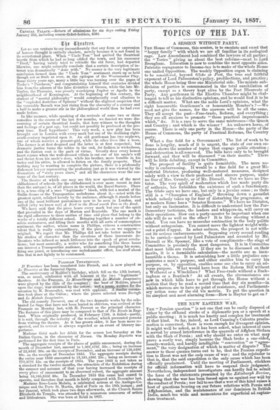t4t t4tatrts.
Let no one venture to say inconsiderately that any form or expression of human thought is entirely obsolete, merely because it is not found in its accustomed place. When "Uncle Tom" had quitted the theatrical boards from which he had so long edified the town, and his successor "Bred," having vainly tried to rekindle the old furor, had departed likewise, one might naturally conclude that a certain description of interest was dramatically "done with." No sooner is the very legitimate conclusion formed than the "Uncle Tom" sentiment starts up as bold though not as fresh as ever, in the epilogue of the Westminster Play. Some thirty years ago, many a little boy was turning over the pages of Tooke's "Pantheon," and congratulating himself that centuries divided him from the adorers of the false divinities of Greece, while the late Mr. Taylor, the Platonist, was piously worshiping Jupiter or Apollo in the neighbourhood of Kennington. At the beginning of this century, the student of "mental philosophy" would complacently read allusions to the "exploded doctrines of Spinoza" without the slightest suspicion that the venerable Baruch was just rising from the obscurity of a century and a half to make a greater stir in the philosophical world than he had ever made before.
In like manner, while speaking of the revivals of some two or three comedies in the course of the last few months, we fancied we were discoursing of certain theatrical fossils, that bore witness to the thoughts and feelings of a past age, but could not possibly be produced at the present time. Rash hypothesis! This very week, a new play has been brought out in London with every mark but one of the declining eighteenth century imprinted upon it. An old gentleman has two nephews, one of whom marries a peasant-girl, while the other lives like a beau. The former is at first despised and the latter is at first respected; but dramatic justice turns the tables in the end, for fashion is wickedness, and the fustian coat is the garb of virtue. Greatly does every honest heart rejoice when the well-dressed villain is out out of his uncle's will and thrust from his uncle's door, while his brother, more humble in his tastes and his attire, is allowed to fatten on the family property. That nothing may be wanting to complete the picture, there is a profoundly dishonest lawyer representing the profession just as it was viewed by the dramatists of "sixty years since," and all the characters wear the costume of the last century. The theatre at which one may see this new specimen of the most oldfashioned of schools (for the oldfashioned is ever more recent in date than the antique) is, of all places in the world, the Royal Surrey. There it is, a true chip of a once " legitimate " block, with not a morsel of the Gallic shame or the Transpontine melodrama about it,—acted with the greatest spirit, relished keenly by the audience, although it stands before one of the most brilliant pantomimes now to be seen in London, and called (why we know not) A Bird in the Hand worth Two in the Bush.
We have said that the piece bears every mark but one of the spirit that prevailed in the days of Morton and Reynolds. The one mark is the rigid adherence to those unities of time and place that belong to the works of a totally different school. Bringing together a number of obsolete caricatures, and filling their mouths with all sorts of commonplace sentiment, the author, whose name is Phillips, evinces a constructive talent that is really extraordinary, if the piece is—as we suppose— original, We regret that Mr. Phillips did not take better models for his studies of character than the creations of those inaccurate delineators who infused so much littleness into the epoch of great revolutions; but most assuredly, a writer who for something like three hours can interest a Trauspontine audience, without once changing his scene, firing one pistol, or introducing one melodramatic effect, has stuff about him that is not lightly to be contemned.


































 Previous page
Previous page